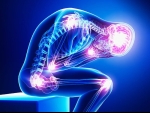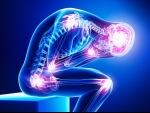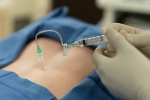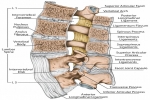Home »
Blog » Back Pain
| Stem Cell, PRP, Acupuncture in Queens & Long Island, New York
Back Pain | Stem Cell, PRP, Acupuncture in Queens & Long Island, New York
Tags: Back Pain | Posted on: 30-Aug-2021 | No of views: 4462 If you find being in pain has left you feeling stressed, anxious, depressed, or a little grumpy, you aren’t alone. These emotions are very common among people living with ongoing pain. Pain can upend every aspect of our lives -- from how we move, sleep, think, feel, and interact with others to earning a living and doing the things that we love most. That can be an awful lot to deal with. A field of psychology called pain psychology can help.
Read more
Tags: Back Pain | Posted on: 27-Aug-2021 | No of views: 3911 Whether it's a herniated disc, spinal stenosis, or strained muscles, it can take some time to diagnose and treat the causes of back pain. And all the while, you're trying to navigate health insurance, work and family life, and everyday stressors in addition to your back pain.
1. Let Your Spine Really Rest While Sleeping - While you're lying down, all the structures in your spine that have worked hard all day finally have an opportunity to relax and be rejuvenated. To make the most of this time, you need a mattress and pillows that allow your spine to rest in a supported and comfortable way.
Read more
Tags: Back Pain | Posted on: 25-Aug-2021 | No of views: 3866 Pain In the Neck and Back Due to Wear-And-Tear or Aging - Spondylosis describes the wear and tear of joints, discs, and ligaments in the spine. Spondylosis is also known as a degeneration (or aging) of the spine. It is a common problem, seen in most people as they grow older. While spondylosis creates neck and back pain in some people, others experience no symptoms at all.
Read more
Tags: Back Pain | Posted on: 23-Aug-2021 | No of views: 3505 Step into any hospital or healthcare institution in the U.S., and there’s a good chance you will find some kind of nod to the arts. It could be an exhibit of paintings, photography, or sculpture, a pianist chiming away in the waiting room, or just a thoughtful and inspiring poem hung on a wall. Many experts believe the arts have the power to promote healing and a better sense of well-being, and when used in this context, it is often referred to as the healing arts. The healing arts encompasses a wide range of artistic expressions including visual art, music, dance, writing, and even drama. Embracing the arts can not only help us feel better but also can reduce pain.
Read more
Tags: Back Pain | Posted on: 21-Aug-2021 | No of views: 3502 Many people with back or neck pain seek alternative and complementary treatments such as massage, spinal manipulation, or yoga in addition to standard medical treatments. Here are some of the best alternative treatments to try for your neck or back pain. Check with your doctor and try a few to see what might work best for you.
Read more
Tags: Back Pain | Posted on: 18-Aug-2021 | No of views: 3611 Spinal stenosis is a condition that typically develops very slowly as we get older, usually occurring after the age of 50. There are cases, however, where the curvature of the spine (scoliosis) or congenital factors may lead to spinal stenosis in younger individuals. The majority of cases of spinal stenosis occur in the lower or lumbar spine. Slippage and misalignment of the vertebrae, known as spondylolisthesis, can also be a cause of spinal stenosis. The most common symptom of spinal stenosis is cramping or aching in the calves. As the condition advances, it becomes increasingly difficult to stand and walk due to the intensity of the resulting leg pain.
Read more
Tags: Back Pain | Posted on: 14-Aug-2021 | No of views: 3918 For most people with back pain, surgery is recommended only after all other options have been exhausted. A common non-surgical approach to pain relief is epidural steroid injections, which help reduce inflammation around your spinal cord and spinal nerves. They are primarily intended for temporary pain relief, but steroid injections coupled with therapeutic exercise may allow patients to postpone or even avoid surgery altogether.
Read more
Tags: Back Pain | Posted on: 11-Aug-2021 | No of views: 3331 PAINFUL JOINT DISEASE IN THE NECK AND BACK - Facts and Information About Spinal Arthritis
-Spinal arthritis is swelling and tenderness of the joints anywhere along the spine, but mostly in the neck and low back areas.
-Several types of arthritis affect the spine. Some are due to aging and wear and tear. Others result from an overactive immune system, an infection, or are inherited.
-All forms of arthritis cause a breakdown of cartilage, the hard and slippery tissue that cushions the ends of bones where they form a joint.
Read more
Tags: Back Pain | Posted on: 04-Aug-2021 | No of views: 3673 A Frequent Source of Lower Back and Leg Pain - One of the most prevalent causes of low back pain occurs with injuries to the sacroiliac (SI) joint and ligaments. Young and middle-aged women are most susceptible to this condition, which can make sitting and standing difficult and painful tasks. If you are experiencing the painful symptoms of SI joint dysfunction, we can help you find relief with accurate diagnostic techniques and effective non-surgical therapy.
Read more
Tags: Back Pain | Posted on: 30-Jul-2021 | No of views: 4040 This top-to-bottom guide gives an overview of spinal anatomy and the potential problems that can cause pain. Understanding your spine's anatomy and inner workings can help you better manage neck or back pain. Your spine is mostly comprised of 3 general regions:
1. The cervical spine contains 7 vertebral bones that run from the base of the skull down through your neck. This region of the spine has a natural inward curve (toward the front of the body), called a lordotic curve. It supports the head above and is relatively mobile, which also makes it more prone to injury. 2. The thoracic spine contains 12 vertebral bones, with the top 10 solidly connected to the rib cage and the bottom 2 connected to floating ribs.
Read more
Love this Post? Spread the World






















